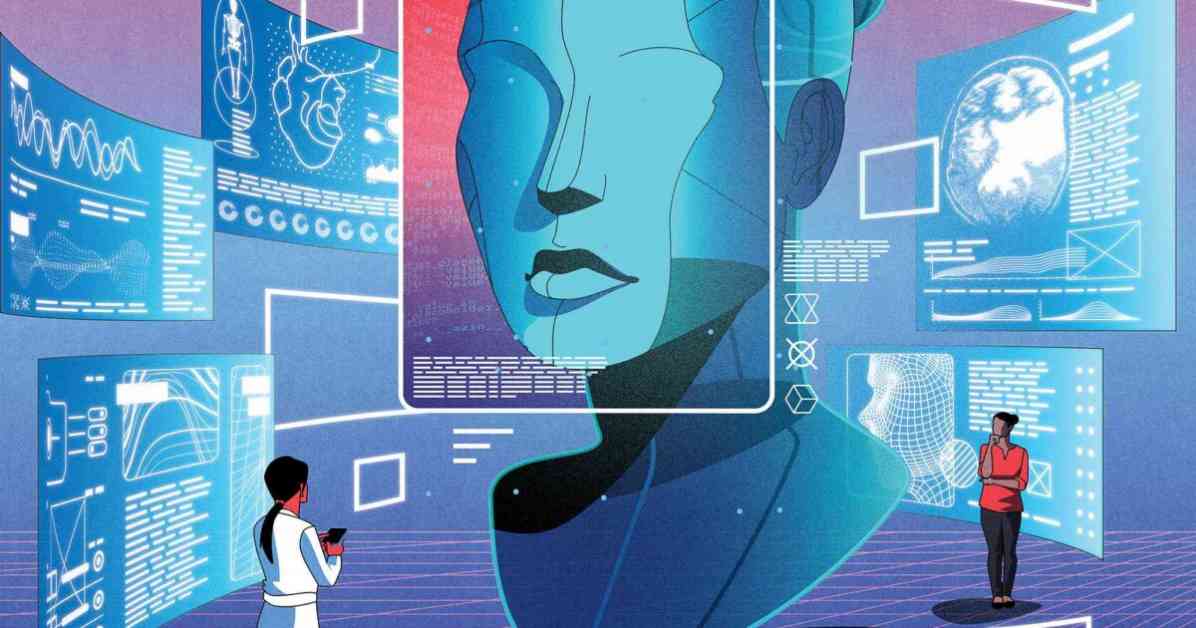The Role of Technology in Revolutionizing Healthcare: The Intersection of AI, Clinicians, and Patients
In the fast-evolving landscape of modern healthcare, the integration of technology is reshaping the way doctors, patients, algorithms, and avatars interact. At the University of Rochester, a collaborative effort between clinicians, computer scientists, and ethicists is underway to harness the power of reliable and ethical artificial intelligence (AI) in medical diagnosis and treatment. This interdisciplinary approach is paving the way for innovative solutions that have the potential to transform the way healthcare is delivered and experienced.
The Journey of Professor Caroline Easton: Blending Technology with Therapy
In 2012, a groundbreaking idea took root in the mind of Professor of Psychiatry, Caroline Easton, as she observed her son engrossed in playing video games. Inspired by the immersive and engaging nature of gaming technology, Easton envisioned a novel approach to integrate video-game technology with her research on addiction and domestic violence. Recognizing the importance of making therapy relatable and engaging for younger clients who have grown up with technology, Easton embarked on a mission to develop a platform that would utilize an avatar coach to guide patients through cognitive behavioral therapy and help them practice coping skills.
Initially, Easton and her team manually created and animated rudimentary avatars. However, advancements in artificial intelligence technology have enabled them to refine the tool, allowing users to customize their avatar coaches to cater to their specific needs. Funded by the National Institutes of Health, the app is currently in the pilot phase, with randomized control trials slated to commence by the end of the summer. Easton envisions that AI tools like this one have the potential to revolutionize addiction treatment by providing continuous support to patients between therapy sessions and empowering clinicians to allocate their time and energy more effectively.
The Transformative Power of AI in Healthcare: A Continuum of Care
Easton’s pioneering use of AI in therapies exemplifies just one facet of AI’s transformative impact on medicine and healthcare. As AI continues to play a larger role in healthcare, questions regarding equitable access, ethical considerations, and the preservation of the human connection arise. How can we ensure that AI advancements benefit everyone fairly and responsibly? How do we ensure that AI serves the best interests of all individuals? And how can advanced technology be seamlessly integrated into medicine without compromising the essential human touch?
The Evolution of Artificial Intelligence in Healthcare: A Historical Perspective
Artificial intelligence is not a new concept, with its theoretical foundations dating back to the 1950s. However, it was not until the late 1990s that significant breakthroughs in computing power enabled AI to transition from theory to reality. IBM’s landmark achievements with Deep Blue and Watson demonstrated the potential of AI in challenging domains such as chess and trivia. Yet, when IBM attempted to leverage Watson in healthcare, significant challenges emerged due to the complexity and variability of healthcare data.
In 2023, a paradigm shift occurred with the emergence of generative AI, spearheaded by OpenAI’s ChatGPT. This revolutionary development marked a turning point in the field of AI, empowering machines to create new content based on learned patterns from vast datasets. Generative AI, trained on an extensive array of parameters derived from structured and unstructured data, holds immense promise for analyzing complex medical images with unparalleled accuracy and efficiency.
The Advantages of AI in Medical Imaging: Enhancing Diagnostic Speed and Accuracy
AI’s integration into medical imaging has revolutionized the way radiologists interpret and analyze diagnostic images. By leveraging AI algorithms to identify urgent issues swiftly, clinicians can prioritize critical cases such as pulmonary embolisms or brain bleeds, enabling more efficient and accurate diagnostics. AI serves as a valuable second set of eyes for radiologists, flagging potential abnormalities in scans and streamlining the diagnostic process.
While AI tools offer critical insights and automate clinical tasks, they do not pose a threat to radiologists’ expertise and judgment. Radiologists play a pivotal role in synthesizing findings, generating likely diagnoses, and interpreting the nuances of complex cases. The collaboration between AI tools and radiologists underscores the importance of maintaining a human-centric approach in healthcare delivery.
Navigating Ethical Considerations in AI Implementation: Ensuring Fairness and Accountability
As AI assumes a more prominent role in healthcare, ethical considerations surrounding bias, transparency, and accountability become paramount. Ethicists like Jonathan Herington emphasize the need for deliberate efforts to address bias in AI algorithms and ensure equitable outcomes for all patient populations. The utilization of diverse and representative datasets, coupled with ongoing human oversight, is essential in mitigating the risks of bias and safeguarding the integrity of AI-driven decisions.
Regulating AI as medical devices through FDA certification is proposed as a means to enhance accountability and ensure the safety and efficacy of AI tools. By subjecting AI algorithms to rigorous testing and validation processes, regulatory bodies can instill trust and confidence in the healthcare community regarding the reliability and performance of AI technologies. The collaboration between academic medical centers and AI developers plays a crucial role in refining and optimizing AI tools for diverse patient populations.
The Imperative of Human Expertise and Empathy in Healthcare: Balancing Technology with Humanity
Despite the remarkable advancements in AI technology, the indispensable role of human expertise, intuition, and empathy in healthcare remains irreplaceable. While AI excels in analyzing data, recognizing patterns, and automating tasks, it lacks the capacity for genuine emotional reactions, beliefs, and intuitive decision-making. Clinicians possess a unique blend of clinical acumen, experience, and compassion that cannot be replicated by machines.
Professor Easton’s innovative approach to integrating AI with therapy underscores the importance of preserving the human connection in healthcare. By designing her app as a complement to clinician-centered therapy, Easton emphasizes the symbiotic relationship between technology and human care. The fusion of AI tools with human expertise enables a holistic approach to patient care, where technology enhances efficiency and accessibility while clinicians provide personalized, empathetic support.
In conclusion, the integration of technology, particularly AI, in modern healthcare represents a paradigm shift in the way medical diagnosis, treatment, and patient care are delivered. The collaborative efforts of clinicians, computer scientists, and ethicists at the University of Rochester exemplify a holistic approach to harnessing the potential of AI while addressing ethical considerations and preserving the human touch in healthcare. As AI continues to evolve and shape the future of healthcare, maintaining a delicate balance between technological innovation and human compassion is essential to ensuring optimal outcomes for patients and clinicians alike.






















